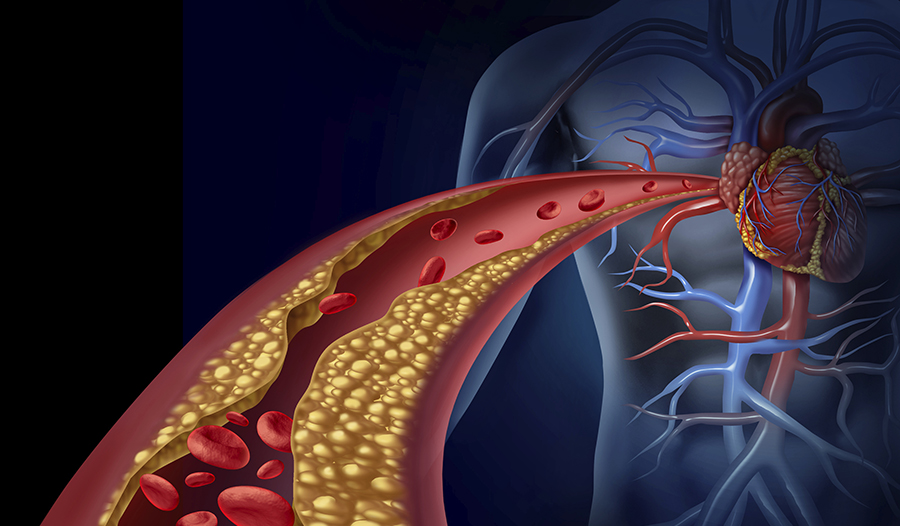Natural Ways to Support Cardiovascular Health
DISCLAIMER:This blog does not intend to provide diagnosis...
- In this article:
- The Importance of Diet
- Supplements to Support Platelet Function
- Fibrin and Nattokinase

One of the primary causes of heart attacks and strokes, atherosclerosis, is the hardening of artery walls due to a buildup of plaque. Normally your arteries are very flexible, like a rubber tube, but plaque causes them to become stiff, and can even block blood flow. Plaque can also lead to the formation of blood clots—thickened clumps of blood that form when blood platelets collect at the site of blood vessel damage.
Platelets are small blood cells that circulate in the blood. They are designed to recognize when blood vessels are damaged to stop any bleeding by forming a blood clot.
Adding to the problem of atherosclerosis is that when a piece of the clot or plaque breaks off, it will eventually circulate and block blood through a vessel that’s too small to allow the clot to pass. Without oxygen as a result of the blocked blood flow, nearby tissue or organs can die. If the clot blocks a blood vessel in the heart, it leads to a heart attack (also called a myocardial infarction). If it happens in the brain, it can cause a stroke. And if it happens in the lungs, it causes a pulmonary embolism. Any one of these events can result in death.
The Importance of Diet
Dietary modifications alone are effective in promoting heart health.2,3 The research on diets for heart health is strongest for the Mediterranean diet and a diet rich in monounsaturated fats, omega-3 fatty acids, flavonoids, and polyphenols. These dietary factors are associated with reduced platelet “stickiness.”
If platelets are too “sticky” it leads to excessive platelet aggregation and clot formation. And that is an independent risk factor for heart disease and stroke all its own.1 The “stickiness” of your platelets is largely determined by the types of fats in your diet and the amounts of antioxidants consumed.2,3 While too much cholesterol, saturated fats, or fats damaged by high heat increase platelet aggregation, omega-3s and monounsaturated fats (e.g., those found in nuts, seeds, olive oil, etc.) have the opposite effect.
Particularly useful for decreasing platelet aggregation are the long-chain omega-3 fatty acids EPA and DHA, found in fish oil. In fact, the beneficial effects of fish oils on platelet aggregation is one of the key reasons why higher levels of EPA and DHA in the diet are associated with heart health.4
For health maintenance, try a fish oil supplement that provides a daily dose of 1,000 mg combined of EPA and DHA. If you already have cardiovascular disease, elevated CRP levels, or high triglyceride levels, the recommended dosage is 3,000 mg daily.
Another important dietary factor that reduces platelet stickiness is flavonoids. These plant pigments are found in such foods as berries, citrus, cocoa powder, dark chocolate, green tea, and many other foods. Flavonoids benefit the heart and blood vessels in many ways, including their ability to prevent excessive platelet aggregation.5
Supplements to Support Platelet Function
In addition to omega-3 fatty acids, there are a number of other dietary supplements that support platelet function. Most notable are antioxidant nutrients, vitamin B 6, garlic, flavonoids, other polyphenols, and enzymes such as nattokinase.
Vitamin B6 exerts several effects on preventing excessive platelet aggregation. Most importantly it increases the level of nitric oxide (NO) within platelets. NO also increases the synthesis of NO by cells that line the blood vessels. NO is a key regulating factor within blood vessels and platelets that prevents excessive platelet aggregation.6
Garlic preparations standardized for alliin content can also inhibit platelet aggregation. In one study, 120 patients with increased platelet aggregation were given either 900 mg per day of a dried garlic preparation or a placebo. In the garlic group, spontaneous platelet aggregation completely disappeared after four weeks, and other measures also improved.7
Flavonoid-rich Extracts: To make sure you’re getting enough of these flavonoid compounds, use at least one of the following:
- Grape seed extract (>95 percent procyanidolic oligomers): 100–150 mg daily.
- Pine bark extract such as Pycnogenol(>90 percent procyanidolic oligomers): 100–150 mg daily.
- Any flavonoid-rich extract with a similar flavonoid/polyphenol content such as blueberry, bilberry, resveratrol, pomegranate, cranberry, or olive leaf extract. Also, a suitable alternative is a “super greens” drink mix containing such super green foods as spirulina, chlorella, barley leaf, etc, or any other plant-based antioxidant with an ORAC score of at least 3,000 per day.
Fibrin and Nattokinase
Platelets are held in plaque by stringy protein strands called fibrin, which is made from smaller particles called fibrinogen. Elevated blood levels of fibrinogen are a major determinate of cardiovascular death. In fact, there is a stronger association between cardiovascular deaths and fibrinogen levels than there is for cholesterol.8 Natural therapies that may help reduce fibrinogen levels include the Mediterranean diet, exercise, omega-3 fatty acids, niacin, garlic, and nattokinase.
If you’re not familiar with nattokinase, it’s a clot-busting enzyme derived from natto—a Japanese food prepared from fermented soybeans. Nattokinase is known to:
- Dissolve excess fibrin in blood vessels, which improves circulation, breaks down clots, and reduces the risk of severe clotting.
- Reduce LDL (bad) cholesterol and increase HDL (good) cholesterol.
- Reduce blood viscosity, improve blood flow, and lower blood pressure.
Clinical studies have affirmed the ability of nattokinase to reduce fibrinogen levels in the blood. Since elevated fibrinogen is a clear risk factor for heart attack or stroke, these results are extremely significant. Two capsules of nattokinase (100 mg or 2,000 fibrinolysis units per capsule) taken daily for two months may decrease fibrinogen levels by 7–10 percent.9
Nattokinase should be used with caution if you take Coumadin or anti-platelet drugs (including aspirin, but especially prescription drugs such as clopidogrel (Plavix), prasugrel (Effient), and ticagrelor (Brilinta).
References:
- Coenen DM, Heinzmann ACA, Karel MFA, Cosemans JMEM, Koenen RR. The multifaceted contribution of platelets in the emergence and aftermath of acute cardiovascular events. Atherosclerosis. 2021;319:132-141.\
- Bachmair EM, Ostertag LM, Zhang X, de Roos B. Dietary manipulation of platelet function. Pharmacol Ther. 2014;144(2):97-113.
- Magrone T, Magrone M, Russo MA, Jirillo E. Platelets: Angels and Demons Dancing on the Immune Stage. Nutrition Conducts the Orchestra. Endocr Metab Immune Disord Drug Targets. 2021;21(7):1196-1218.
- Gao LG, Cao J, Mao QX, Lu XC, Zhou XL, Fan L. Influence of omega-3 polyunsaturated fatty acid-supplementation on platelet aggregation in humans: a meta-analysis of randomized controlled trials. Atherosclerosis. 2013;226(2):328-334.
- Behl T, Bungau S, Kumar K, et al. Pleotropic Effects of Polyphenols in Cardiovascular System. Biomed Pharmacother. 2020;130:110714.
- Wu Y, Liu Y, Han Y, et al. Pyridoxine increases nitric oxide biosynthesis in human platelets. Int J Vitam Nutr Res. 2009;79(2):95-103.
- Chan JY, Yuen AC, Chan RY, Chan SW. A review of the cardiovascular benefits and antioxidant properties of allicin. Phytother Res. 2013;27(5):637-646.
- Surma S, Banach M. Fibrinogen and Atherosclerotic Cardiovascular Diseases-Review of the Literature and Clinical Studies. Int J Mol Sci. 2021;23(1):193.
- Weng Y, Yao J, Sparks S, Wang KY. Nattokinase: An Oral Antithrombotic Agent for the Prevention of Cardiovascular Disease. Int J Mol Sci. 2017;18(3):523.

 By Dr. Michael Murray, N.D.
By Dr. Michael Murray, N.D. 


